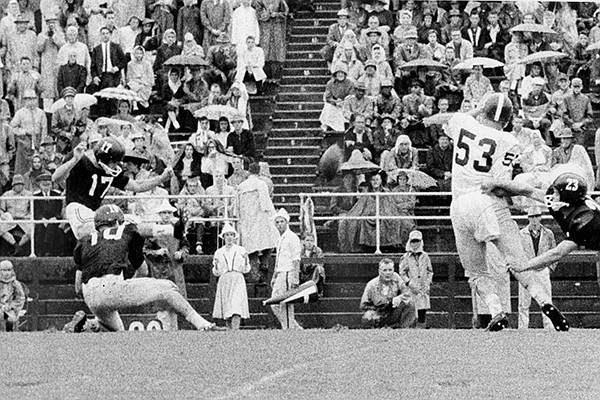Fred Akers will be remembered for football contributions both to the Arkansas Razorbacks and Texas Longhorns, not the most common daily double in sports.
As a Razorback player, he kicked a field goal for the only points in a 3-0 game with TCU in 1959 that propelled Arkansas to its first of three straight Southwest Conference championships under Frank Broyles. A Blytheville native, Akers later served as an assistant to Darrell Royal at Texas before returning to Austin in 1977 as head coach of the Longhorns.
What Akers, who died Monday at age 82, could not be was the next Darrell Royal. Texas fired him after 10 seasons that the Longhorns won big, producing the school's first Heisman Trophy winner, but not enough to please the "suits" who run Texas football.
Texas, remember, was losing frequently to Oklahoma and Barry Switzer (another ex-Razorback) before Royal, after 20 years on the sideline, exited stage right after the 1976 season. He and Broyles, finishing 19 years at Arkansas, rode off into the same sunset, Broyles as UA athletic director but with Royal somewhat estranged from the UT program.
Royal could not even name his successor as head coach. The plan was that Mike Campbell, his longtime defensive overseer, would replace Royal in a seamless transition. A defunct Austin newspaper jumped the gun and proclaimed in a front-page banner headline: "It's Mike!" It wasn't Mike.
UT, then and now concerned with image, bristled at Royal's association with Willie Nelson and other long-haired country singers. All the while, Oklahoma was running up the score on Texas both on the field and in recruiting. Akers, coming back to Austin from Wyoming, was effectively told by school officials to go his own way and have little to do with Royal.
Mainly because Earl Campbell got well and became an all-conquering I-back (Texas junking Royal's Wishbone offense), Akers enjoyed a smashing first season at Texas. He achieved the twin parlay in October that any Longhorn fan could find precious, 13-6 over Oklahoma and 13-9 over Arkansas, those Razorbacks headed to the Orange Bowl (and a 31-6 ambush of Oklahoma) under Broyles' hand-picked successor, Lou Holtz. In Campbell, less than 10 years after Texas broke the color barrier, the school had a Black Heisman Trophy winner.
Akers' honeymoon at Texas ended, or at least became more complicated, after a Cotton Bowl date with Notre Dame. A young quarterback who would be heard from, named Joe Montana, passed for a touchdown in a 38-10 Irish stampede. Notre Dame, ranked fifth before the bowls, snapped up the national championship left on the table by the No. 1 Longhorns.
"We were the best team that year," Akers said later, "but not that day."
Miami is remembered for winning the 1983 national championship with an Orange Bowl conquest of Nebraska, 31-30 when a late two-point conversion attempt failed. That outcome would have been moot had Texas taken care of business in the afternoon against Georgia in the Cotton Bowl. The otherwise undistinguished John Lastinger ran for the game's only touchdown in a 10-9 Georgia victory that cost the Longhorns a national title.
If not before, that tore it with a lot of Texas fans. The 1984 Longhorns lost 55-17 to Iowa in the Freedom Bowl with few Orangebloods going to Anaheim, Calif., for the game. In another '84 outcome that cost Akers credibility, a top-ranked Texas team kicked a late field goal to tie Oklahoma rather then play for the win in a driving rain. Win or lose, a Royal-coached team never settled for a tie.
Like Ken Hatfield, then at Arkansas, Akers couldn't win enough to please Longhorn Nation. In nine seasons, the Longhorns won 86 games under Akers -- only Royal and Mack Brown have more victories at the school -- but went 2-7 in bowl games, a definite downer for several teams loaded with pre-NFL talent.
Akers later spent four seasons at Purdue. I remember seeing him in a Houston hotel lobby before Arkansas played Texas in the Texas Bowl after the 2014 season.
Any coach must be his own man, but Akers was measured against a living legend. Whereas Royal might have listened to Waylon Jennings or Jerry Jeff Walker, Akers might have preferred Michael Bolton or John Tesh. "I've gotta be me," which Akers seemed to be saying, didn't go over well in Austin.
"He was always buttoned up, put together. It was about respect," his wife, Lesli Akers said. "He respected his position and how he represented the state, the university, the people and the players."
Against Arkansas, Akers went 7-3 – Holtz-coached teams winning in 1979 at Little Rock and 1981 at Fayetteville, a 42-11 crusher that the Razorbacks treasure to this day, and Hatfield's 1986 squad at Austin.
Akers' name came up when Broyles said he would consider only ex-Razorbacks to succeed the fired Holtz in 1983. So did Barry Switzer's, although the choice came down to Hatfield and Jimmy Johnson. Broyles went with Hatfield, at which time, Johnson wrote later, his former Arkansas coach became a non-person in his life. The 1987 Arkansas-Miami game in Little Rock -- 51-7 for Johnson-coached Miami -- speaks to his response.
It has been written that an Oklahoma or Texas coach doesn't usually give up his position voluntarily. Tom Herman's current problems show that Texas is still having trouble with image. So fractured are the Longhorns these days that playing "The Eyes of Texas" before games has become an issue.
